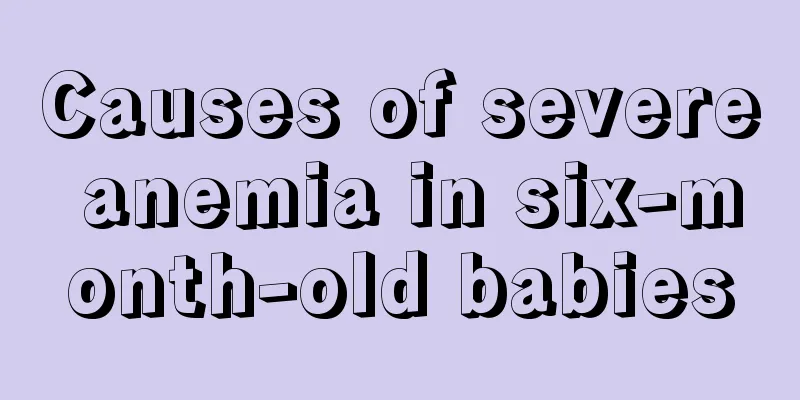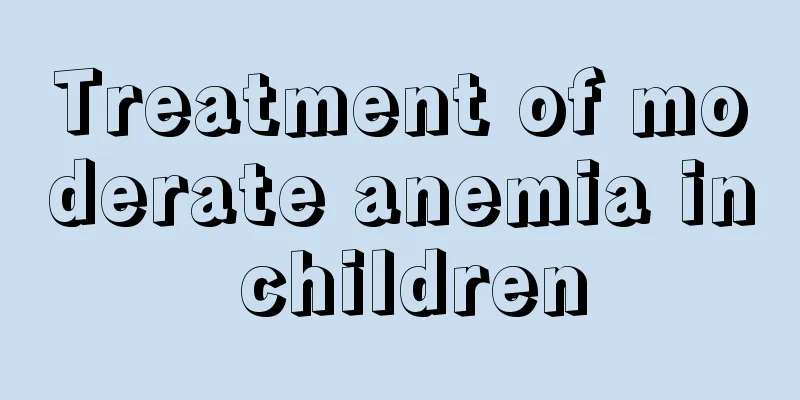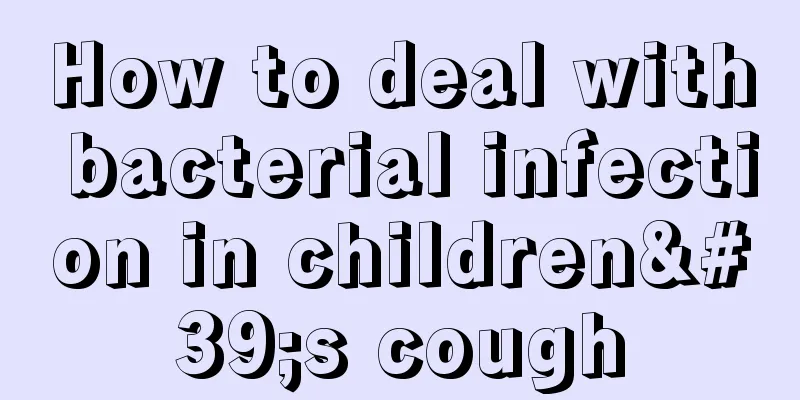Causes of severe anemia in six-month-old babies

|
There are three types of anemia, one is a mild disease, another is a moderate disease, and the most serious is severe anemia. When a child has anemia, the disease will continue to worsen. This only happens when the child is not treated in time. Therefore, the child’s disease must be treated in time, but the treatment must find the right cause to treat it reasonably. So what is the cause of severe anemia in babies? According to the cause of the disease, anemia is divided into three categories: hemorrhagic, hemolytic and hypoplastic: 1. Hemorrhagic anemia (1) Acute blood loss such as trauma, hemorrhagic diseases, etc. (2) Chronic blood loss such as intestinal malformations, ulcer disease, hookworm disease, intestinal polyps, idiopathic pulmonary hemosiderosis, etc. 2. Hemolytic anemia (1) Intrinsic defects of red blood cells ① Red blood cell membrane defects such as hereditary spherocytosis and hereditary elliptocytosis. ② Red blood cell enzyme deficiency such as glucose-6-phosphate dehydrogenase deficiency, pyruvate kinase deficiency, etc. ③ Abnormalities in hemoglobin synthesis and structure such as thalassemia, abnormal hemoglobin disease, etc. (2) External abnormalities of red blood cells ① Immune factors include the presence of antibodies that destroy red blood cells, such as neonatal hemolytic disease, autoimmune hemolytic anemia, drug-induced immune hemolytic anemia, etc. ② Infectious factors such as parasites, bacterial toxins, and hemolysins destroy red blood cells. ③ Chemical and physical factors such as benzene, lead, arsenic, snake venom, burns, etc. can directly destroy red blood cells. ④Others such as hypersplenism. 3. Insufficient red blood cell production (1) Iron deficiency anemia and nutritional megaloblastic anemia due to lack of hematopoietic substances. (2) Bone marrow suppression, aplastic anemia, severe infection, malignant tumors, etc. [1] The following are some common causes of anemia in children: 1. Nutritional iron deficiency anemia Nutritional iron deficiency anemia is the most common type of anemia in children. The main clinical feature is microcytic hypochromic anemia, which is common in children aged 6 months to 2 years. (1) Insufficient iron storage in the body: The amount of iron the fetus obtains from the mother is highest in the last three months of pregnancy. The amount of iron stored in a normal full-term newborn is about 250 to 300 mg (average 60 to 70 mg/kg). The stored iron and the iron released by the destruction of red blood cells after birth are sufficient to meet the needs of hematopoiesis within 3 to 4 months after birth. If iron storage is insufficient, iron deficiency anemia is more likely to occur early in infancy. Severe iron deficiency anemia in the mother, premature birth or twin pregnancy resulting in low birth weight of the baby, and blood loss from the fetal circulation (such as fetal blood transfusion to the mother or blood transfusion to the other twin fetus) are all causes of reduced iron storage in the newborn. Delaying umbilical cord clamping after birth can provide the newborn with an additional 35 mg of iron. (2) Insufficient iron intake: Insufficient iron supply in the diet is an important cause of iron deficiency anemia. The iron content in human milk and cow's milk is low and insufficient for infants. If infants are fed with milk alone without adding iron-rich complementary foods in time, iron deficiency anemia is likely to occur. Iron deficiency anemia may also be caused by iron absorption disorders due to long-term diarrhea, gastrointestinal malformations, intestinal malabsorption, etc. (3) As the body weight increases, the blood volume increases accordingly as the growth rate increases. The faster the growth rate, the greater the iron requirement, and the more likely it is to suffer from iron deficiency. By the time an infant is one year old, his or her weight will have tripled to three times that of his or her birth weight; for premature infants, the weight may increase to five to six times. Therefore, infancy, especially premature infants, are most susceptible to iron deficiency anemia. (4) Iron loss or excessive consumption, food allergies, intestinal polyps, Meckel's diverticulum, hookworm disease, etc. can also cause intestinal blood loss. Losing 1 ml of blood is equivalent to losing 0.5 mg of iron. Long-term, small-scale blood loss is an important cause of iron deficiency anemia. Long-term and repeated infectious diseases can cause anemia due to increased consumption. There are many types of anemia, and the symptoms of different types of anemia are different. No matter what the cause of anemia is, treatment must be timely. The treatment method will be different depending on the severity of the disease. In serious cases, children need to be given blood transfusions for treatment. If it is not very serious, then good daily life care and improvement, and eating more blood-enriching foods can improve the disease. |
<<: How to treat moderate anemia in babies
>>: Symptoms of severe calcium deficiency in babies
Recommend
What should I do if my baby falls asleep while feeding?
Now that we have grown up, many people envy babie...
9 How smart a seven-month-old baby is
After the baby is six months old, he can learn ma...
How to determine if a child has foreskin that is too long?
Many adult men know the harm of excessive foreski...
Changes in the developmental standards of three-year-old babies
Three-year-old babies are in a very good developm...
Can I continue to wean my baby if I feel uncomfortable weaning?
Milk powder is the food that babies need the most...
What to do if you are allergic to milk
Many babies are allergic to milk due to physical ...
When is the best time to correct a child's crooked teeth?
Nowadays, most of the children born in the 2000s ...
When is the best time for a child’s brain to develop?
Newborn babies sleep a lot every day and are very...
What should I do if my child is frightened and has a fever?
Because children are unfamiliar with things in th...
How to train children's attention?
Children's learning problems are the most con...
Child coughing and nasal congestion
Children's coughs react more severely than ad...
How to turn the foreskin of a child
Nowadays, many children have the phenomenon of fo...
How to determine whether your child is zinc deficient
Zinc deficiency is a common condition in children...
Why do children yawn?
In our daily lives, both adults and children yawn...
How to dissolve phlegm in baby’s nasal cavity?
When we have phlegm in our throat or nasal cavity...









